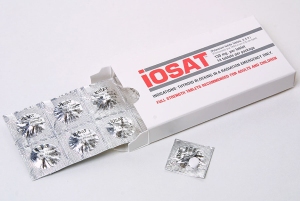 by James J. Galligan, Ph.D., Associate Chair,
by James J. Galligan, Ph.D., Associate Chair,
Department of Pharmacology and Toxicology
Chantix (Varenicline) is one of the most popular smoking cessation drugs available by prescription. However, a number of problems with this drug have been identified and this has led to many restrictions on its use. These problems include an increased incidence of depression, suicidal thoughts, lightheadedness and fainting.
Results of a recent study published in the Canadian Medical Association Journal add another potential problem for Chantix. These investigators conducted a meta-analysis of 14 published papers describing the beneficial and negative effects associated with Chantix when used to treat nicotine addiction. The investigators included only double-blind randomized controlled trials in their analysis. This means that subjects and investigators did not know who was receiving Chantix vs. placebo (simply a sugar pill with no active ingredients) and subjects were assigned to the Chantix or placebo group randomly. This reduces the chance that subjects at risk for cardiovascular problems were assigned more frequently to the Chantix group. The investigators analyzed data from 8,216 subjects. Their study revealed a small but statistically significant increase in the risk for cardiovascular problems such as heart attacks or strokes in the subjects taking Chantix. Although there was a difference, it was small. In the Chantix group 52 of 4908 (1.06%) subjects experiences a so called adverse cardiovascular event while in the placebo group 27 of 3308 (0.82%) subjects experienced the same kind of event.
There are some points worth discussion here. Firstly, it is not surprising that Chantix might be associated with cardiovascular complications. Chantix is a nicotine replacement therapy. Therefore, Chantix shares many of the same pharmacological actions of nicotine. Cigarette smoking does increase the risk of cardiovascular disease partly because cigarette smoke contains nicotine (cigarette smoke also contains carbon monoxide and other toxins which are not present with Chantix). Nicotine increases blood pressure and increase blood clots which can cause heart attacks and strokes and Chantix may do this as well. Secondly, although the increased risk for adverse events in the Chantix group was small, the overall sample size was also small (<5,000 subjects). Worldwide, there are millions of people using Chantix to help kick the smoking habit and therefor a much larger number of patients might be at risk worldwide.
Finally, it is important to remember that all drugs cause side effects (some worse than others). When deciding whether or not a drug should be used, the doctor and patient must consider the risk vs. the benefit. Chantix might produce a small increase in the risk for a heart attack or stroke in a patient trying to kick the nicotine habit. But, what is the heart attack/stroke risk for that patient if he/she continues to smoke? Many smokers become former smokers without the need for drugs like Chantix but there are also many smokers who have quit hundreds of times. This is the subset of people who are most likely to benefit from nicotine replacement treatments. Larger studies will likely reveal the real risk/benefit ratio of Chantix when used to treat nicotine addiction.
In the meantime, the wise person will discuss these issues with their doctor before using Chantix to help kick the smoking habit.
Additional information available can be found at:
- Nature News Blog
- CNN
- “Pfizer questions findings of new report on smoking-cessation treatment Chantix” – mlive.com

